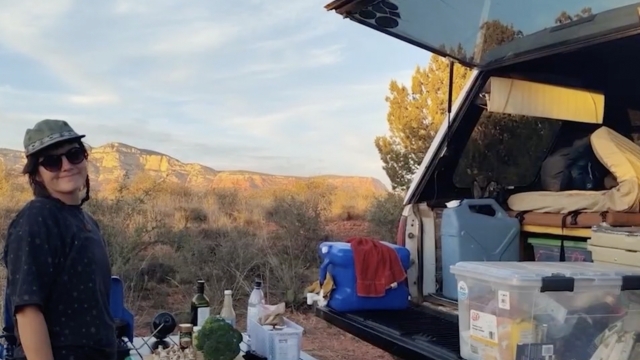Just two hours north of Phoenix lies Sedona, a city surrounded by massive red rock formations. The desert paradise is known for its serene beauty, but just past the majestic canvas lies a housing crisis and a community clashing over a program that would allow people to legally sleep in their cars overnight.
On March 12, Sedona city council members listened to hours of potent remarks from residents who largely opposed the Safe Place to Park proposal. Many voiced fears of increased crime, claims the city's mayor said were fueled by misinformation. By the end of public comments, the city council voted 6-1 to pass the proposal. Less than 48 hours later, Sedona resident Bill Noonan filed a referendum application pausing the implementation of the program.
“I've heard stories about people being awakened by the police in the middle of the night, and, you know, I agree that's unfortunate, but I think there are other solutions,” Noonan said. “We'd moved to Sedona in part to get away from some of the homeless problems in Portland, and I just did not want to see that that problem replicated here.”
The two-year Safe Place to Park program would provide a legal parking area for up to 40 Sedona employees living in their vehicles and include amenities like showers and bathrooms. The lot would be located on a 5-acre site which is part of the 40-acre Cultural Park, and city officials said it would only be open during designated hours. According to the plan, the site selected is nearly 5 miles from downtown and will be managed by the Verde Valley Homeless Coalition, and the program will be funded by an Arizona Department of Housing grant.
“People would come and know that they're in a safe place and it's all controlled,” Mayor of Sedona Scott Jablow said. “These people have lived here and have been forced out and evicted.”
Andrea Vandorn works in Sedona and supports the program. She said in 2021 money was tight, and finding affordable housing was tough, so she embraced car camping. Vandorn said she lived out of her truck for six months, and her partner did the same. Vandorn said they slept in a nearby national forest and used a gym membership to shower.
“It was really challenging having to figure out where I was sleeping every night and having to go to work and hold down a full-time job,” Vandorn said.
SEE MORE: Renting will be cheaper than buying a home for years, report finds
Jablow said they are in a landlocked city and face many challenges that have exacerbated the housing crisis over the years.
“I am not proud of this, the council is not proud, our staff is not proud,” Jablow said. “This is a last-ditch effort.”
According to a city official, months of research went into the program's development, including looking at other states with a similar initiative. In 2020, Colorado launched the Colorado Safe Parking Initiative.
Shannon Boone, the Sedona Housing manager, said the latest data shows the average cost of a home is $990,000, and the average rent is $2,200. According to Boone, only 4% of homes in Sedona are apartments, and 17% of the homes are short-term rentals. The mayor blames the high percentage of short-term rentals for further diminishing housing affordability.
“My neighborhood is now 40% short-term rentals,” Ann Kelley said. She moved from Seattle to Sedona more than five years ago and said if they don’t come up with a plan to help house employees, local business will suffer.
“I mean, this is minimal for the people that are supporting us,” Kelley said.
In 2016, former Arizona Gov. Doug Ducey signed a law that prohibits municipalities from restricting short-term rentals.
Jay Williams is a regional manager for a local business in Sedona. He said despite efforts, salaries just can’t keep up with housing costs.
“I know plenty of other workplaces in the area also pay high wages and it's just not enough with the extremely high rents,” Williams said.
To become eligible for the Safe Place to Park program, the city is requiring proof of Sedona employment. Eligibility is extended to those who are self-employed and those who cannot be employed because they are retired or disabled.
Noonan warns that setting requirements for the program could open up the city to accusations of discrimination. He said he does not have faith in the city's plans. He has until April 11 to garner nearly 600 signatures to put the parking program on the November ballot and let residents decide. “I'm confident we can get to at least 1,000 [residents who] do not want the Cultural Park turned into a homeless car park,” Noonan said.
Some residents have sought to revive the Cultural Park into a music venue and have suggested moving the overnight parking lot to another site, but Jablow said the park is the only viable option with the necessary infrastructure for the initiative.
The city is preparing to break ground on new housing in July and it will include affordable housing for local employees, but the units will not open until 2025. Jablow calls the overnight parking program a temporary solution that will sunset in 2026.
“Make no mistake, this is not our answer to housing and we're all just a little bit embarrassed that we have come to this, that we even have workers that are living in their vehicles,” Linda Martinez, a founding member of the Sedona advisory group said. “All it is, is a small measure of decency for people who are already living in their cars or vehicles and working in our community.”
Vandorn has worked in Sedona the last three years, and she plans to submit her work resignation at the end of May, but said if the program is implemented, she may reconsider staying.
“The showers and bathrooms, a huge plus,” Vandorn said.
Trending stories at Scrippsnews.com





